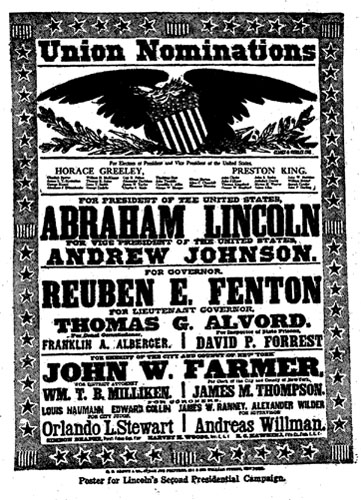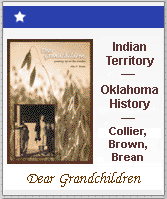
 |
 |
|
| |
||


How We Elected LincolnA.J. Dittenhoefer
<<Prev intro I II III IV V VI VII VIII IX Next>> page 85: IX THE CAMPAIGN OF 1864THE campaign for the Republican ticket began before the name of the Democratic candidate was known. Speakers were haranguing the people in every Northern State, but if Mr. Lincoln's doubts about his renomination had been serious, his fear of defeat at the polls developed into a veritable mental panic. Both Nicolay and Gideon Welles refer to the following note, which, indorsed on the back by all the Cabinet members, was sealed and committed to the keeping of the Secretary of the Navy, with instructions that it should not be opened until after election. I believe that the original has been presented by Miss Nicolay to the Library of Congress:
page 86: It will be seen that this remarkable document bears date six days before the assembling of the Democratic convention at Chicago, on August 29. At that time Mr. Lincoln was aware of the plan to nominate McClellan, and feared his strength. In the interval between the Republican convention, early in June, and the gathering of the Democrats at the end of August, the progress of the Federal arms had not realized expectations. Grant had not taken Richmond, and Sherman had not administered a decisive blow to General Johnson. Politically, the situation was somewhat more hopeful. The selection of Andrew Johnson as Vice President on the Republican ticket had conciliated many Northern Democrats like Judge Holt, General Dix, and General Butler; moreover, it had prevented recognition of the Confederacy by France and England. Lincoln 's foresight in substituting the Tennessean for Hannibal Hamlin, of Maine, was generally admitted. McClellan developed more strength than was suspected. The best opinion is that, had the election occurred directly after his nomination and before people had had opportunity to study the platform upon which he had consented to stand, he would have been successful. Soon after the Democratic convention adjourned, however, the capture of Atlanta by Sherman was announced; then page 87: followed the sturdy blows of Grant at the Confederate capital and Sheridan's series of victories in the Shenandoah Valley. These happy events completely changed the political attitude of the country. The Democratic managers at Chicago had committed the execrable blunder of declaring in their platform that the war had been a failure and that the public welfare demanded "an immediate effort be made for a cessation of hostilities, with a view to an ultimate convention of all the States." Little more than two months remained before election day in November, and every speaker that could be commandeered was put into active service. Lincoln himself took no active part in the campaign outside of a few addresses to soldiers, but mass-meetings were held every day and night of the week, and popular preachers with Republican sympathies filled their discourses with appeals in behalf of Lincoln and the necessity of his re-election for the preservation of the Union. Henry Ward Beecher became a tower of strength to the Lincoln cause, and in and out of Plymouth pulpit he advocated the duty of sustaining the administration that had already saved the Union and must ultimately put down the rebellion. I addressed meetings every night. The campaign soon became one of great acrimony on both sides. Night and day, without page 88: cessation, young men like myself, in halls, upon street corners, and from cart-tails, were haranguing, pleading, sermonizing, orating, arguing, extolling our cause and our candidate, and denouncing our opponents. A deal of oratory, elocution, rhetoric, declamation, and eloquence was hurled into the troubled air by speakers on both sides. Denunciation of Lincoln by Democratic spellbinders was of the bitterest character. Newspapers affiliated with the anti-war party criticized every act of the administration and belittled the conduct of the war by Federal generals in the fled. Therefore, Republican speakers did not mince words in criticism of the Democratic Presidential candidate, Gen. George B. McClelan. On September 27, five weeks before election day, I spoke to an audience that filled every seat in Cooper Institute, on the questions of the hour. Read in the calmness of to-day my language appears unwarrantedly aggressive, but at that time it seemed conservative. As an example of the spirit of the campaign I venture to quote a few extracts: The battle that will be fought in November between the Union and the Confederate forces north of the Potomac will end in the destruction or exhaustion of the Southern Confederacy. Abraham Lincoln is the commander of the Union forces. I will now prove that George B. McClellan is the leader of the Confederate forces. page 89: While at the head of the Army, McClellan attempted to dictate to President Lincoln a policy acceptable to the Confederate South. Every man in the North influenced by "Copperheads," who opposed the war, demanded that this "fighting general" be replaced at the head of our armies. He had become harnessed to the slave power, and he, with General Pendleton, candidate for Vice-President, became the incarnation of the Democratic peace platform. McClellan's nomination was received with enthusiasm and cheers by the Confederate soldiers; the Southern newspapers declared that McClellan's election would be helped by Grant's defeat in the fled. Confederate bonds advanced on the announcement of McClellan's nomination. Every Southern sympathizer in the North, passive or active in his devotion to Jefferson Davis, will vote for McClellan. He says in his letter of acceptance that his sentiments are identical with those of the platform which pronounced the war a failure, and he promised, if the Democratic candidate were elected, an immediate cessation of hostilities. I called attention to the fact that such men as Fernando Wood, Vallandigham, and Horatio Seymour, once Governor of New York, supported McClellan, thus indorsing the letter of acceptance, in which he promises to enforce the policy set forth in the peace platform of his party. McClellan's military career, consistent with his whole history, may be summed up in one word-"delay"-which gave to the Confederacy what it needed-time. Is it not then true that McClellan heads, in this campaign, the Confederate forces North? I then read the following excerpt from the Democratic platform:page 90: Resolved, that this Convention does explicitly declare, as the sense of the American people, that after four years of failure to restore the Union by the experiment of war during which, under the pretense of a military necessity for a warpower higher than the Constitution, the Constitution itself has been disregarded in every part; and public liberty and private right alike trodden down, and the material prosperity of the country essentially impaired, justice, humanity, liberty, and the public welfare demand that immediate efforts be made for the cessation of hostilities, with a view to the ultimate convention of the States or other peaceful means, to the end that at the earliest practicable moment peace may be restored on the basis of Federal Union of the States. Resolved, that the direct interference of the military authorities of the United States in the recent elections held in Kentucky, Maryland, Missouri, and Delaware was a shameful violation of the Constitution and a repetition of such acts in the approaching election will be held as revolutionary and resisted with all the means and power under our control. In other words [I resumed], it was a bold and pernicious declaration of hostilities that war should close at once and that a convention should be called at a later period, to revise the Constitution. But it is easy to comprehend that when such a convention should be called, Jefferson Davis would refuse to enter its doors, and be prepared to enforce his refusal. Jefferson Davis, his resources crippled and with his last levies on the firing-line, is naturally anxious that Lincoln be defeated, for he knows, by this time, that with Lincoln as President the Confederacy will be compelled to abandon a hopeless contest. Davis cannot, and will not, continue the fight if Lincoln is re-elected, notwithstanding his threat to "fight to the last ditch." page 91: Lincoln 's re-election will banish all hope of triumph for the Confederacy. A firm and everlasting peace will follow, based upon a reconstructed Union and freedom everywhere. The American Union, strong, powerful, and freed from slavery, will be honored the world over.
Large sums of money were expended in expensive printing during that campaign. Some of the publications were elaborately designed and illustrated. Recently one of the Lincoln and Johnson posters has been presented to me, and the miniature reproduction on the following page should be of interest. The names of the electors for the State of New York include that of the writer. The poster is printed in several colors, it is five feet high and three and one-half feet wide. It is in a perfect state of preservation. As I have indicated, the victories of Sheridan and Sherman produced a revulsion against peace sentiment throughout the North that literally swamped McClellan. The popular vote was large, Lincoln securing 2,213,665 votes, and McClellan 1,802,237 votes. Except among the troops from Pennsylvania and Kentucky, the soldier vote was overwhelmingly in favor of Lincoln. This was a surprise. page 92: page 93: It is interesting to illustrate the growth of our country by a comparison with the popular vote of 1912 when Nilson received 6,291,776 votes, Taft 3,481,119, and Roosevelt 4,106,247. Of the electoral votes, Lincoln received 212, and McClellan only 21. Until the defeat of Mr. Taft by Woodrow Wilson in 1912, this was a record of defeat. In the latter year Mr. Wilson received 435 votes, Mr. Taft 15, and Mr. Roosevelt 81. The electoral ticket for Lincoln having been successful in New York State , the thirty-three electors, of whom I was one, met at Albany and cast the votes of the State for Abraham Lincoln and Andrew Johnson. The ballots were inscribed on wooden blocks, and read as follows:
and underneath, in brackets,
A few weeks later I took one of these wooden block ballots with me to Washington and showed it to the President. Lie asked me if I would not give it to him as a souvenir, which I was very glad to do. Horace Greeley and Preston King were the two electors-at-large. Although Greeley had violently opposed the renomination of Lincoln, wise page 94: counsels put him at the head of the Presidential electors, a compliment that Mr. Greeley told me highly gratified him, in view of his previous attitude toward the President. I was present at the second inauguration and heard the address the great President delivered. It is a wonderful piece of English composition, which will continue to live when the monuments of bronze and marble erected to his memory have crumbled to dust. In it occurred these unforgettable words: With malice toward none, with charity for al, with firmness in the right, as God gives us to see the right, let us strive to finish the work we are in; to bind up the nation's wounds; to care for him who shall have borne the battle, and for his widow and orphan—to do all which may achieve and cherish a just and lasting peace among ourselves, and with all nations. When Mr. Greeley became the Democratic candidate for President in 1872 and many Republicans seceded from the Republican party, Mr. Greeley requested me to act as chairman of the executive committee of the Liberal Republican Central Committee in New York City, and I consented to do so. Chauncey M. Depew, who also identified himself with the Liberal Republican organization, became the candidate of the party for Secretary of State of New York. I afterward regretted that I had joined in that move- page 95: ment, and my regret was intensified when Greeley 's campaign turned out to be so great a fiasco. Lincoln's assassination, April 12, 1865, thwarted the generous, noble-hearted plans which he had devised for the restoration of the Union, and resulted in imposing upon the Southern people by Andrew Johnson, Lincoln's successor, the corrupt "carpet-bag" regime. Lincoln 's place in the history of civilization is immutably fixed. During the last ten years of his career he was the greatest of all living men. As statesman and reformer he belongs not alone to America, but to the whole world. George Washington established this Republic, but the curse of human slavery adhered to the otherwise splendid Government he was so largely instrumental in creating. Abraham Lincoln eradicated this curse. Halleck's verse comes back to me again as I close these recollections:
THE END
<<Prev intro I II III IV V VI VII VIII IX Next>>
© 2006 Alta Omnimedia. This work may be used freely by individuals for research, teaching, and personal use as long as this statement of availability is included in the text. Feel free to point to this Web page if you'd like, but please don't just copy its contents. |
 |
Copyright © 2005-2016 Alta Omnimedia. All Rights Reserved.




